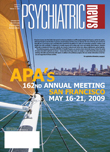A question-and-answer forum and several symposia will highlight recent developments in the revision process for the fifth edition of the Diagnostic and Statistical Manual of Mental Disorders (DSM-V). All sessions will take place Monday and Tuesday, May 18 and 19.
The forum, “DSM-V: Progress in Research and Development,” will provide an opportunity to hear experts from the DSM-V Task Force respond to questions and concerns about the revision process.
“Outreach and dissemination are vital components of DSM-V development,” said Darrel Regier, M.D., M.P.H., vice chair of the DSM-V Task Force and executive director of the American Psychiatric Institute for Research and Education (APIRE).
“The overarching goal for the members of the DSM-V Task Force and work groups is to produce a manual that not only adheres to the scientific base but is meaningful and useful to clinicians and their patients. Feedback from those in the psychiatric community and from researchers and health care providers at large helps inform their decision-making process. It is both our responsibility and our pleasure to make DSM-V an inclusive endeavor.”
Two of the three symposia will address issues that apply to all diagnoses.“ Public Health Aspects of Diagnosis and Classification of Mental Disorders: A DSM-V Research Agenda” will feature five presentations on public health, consumer, and primary care implications of the classification of psychiatric disorders. This symposium will review points raised at the DSM-V public health planning conference—one in a series of 13 conferences funded by the National Institutes of Health to provide the research base for DSM-V revisions.
The second symposium, “Evolution of the DSM-V Conceptual Framework: Development, Dimensions, Disability, Spectra, and Gender/Culture,” will underscore cross-cutting issues facing all members of the diagnostic work groups, such as how to consider gender-specific and age-specific features of disorders.
The remaining symposium, “In or Out? A Discussion About Gender Identity Diagnoses and the DSM,” will focus on diagnostic issues specific to gender identity disorder, particularly the issues of having gender identity disorder listed in DSM-V and the implications of removing it. Several leaders in the transgender community will speak at this symposium.
William Narrow, M.D., M.P.H., DSM-V research director and associate director of APA's Division of Research, said that the focus on both specific disorders and broader issues in the development of DSM-V is a noteworthy feature of this year's sessions.
“There are certainly specific disorders that have attracted a fair amount of attention, and it is important that we address the issues around these disorders, as we are doing this year with gender identity disorder,” he said. “But it is also important for our members to understand the overarching issues being tackled in the revision, which could affect all disorders. The incorporation of dimensional assessments, improvements in the assessment of disability, and having a more developmentally sensitive approach to diagnosis should make DSM-V a much more effective tool for improved patient care.”
APIRE invites questions and comments for the forum, which can submitted either by e-mail at [email protected] (with “DSM-V Forum Question” in the subject line) or online at<www.dsmv.org>. DSM Track Schedule
Speakers in the sessions below will give updates on the development of DSM-V. In the first session listed below, annual meeting attendees will have an opportunity to ask questions of the experts working on the diagnostic manual. All sessions will be held in the Moscone Center.
MONDAY, MAY 18
Noon-1:30 p.m.
DSM-V: Progress in Research and Development
Room 102, Gateway Level
2 p.m.-5 p.m.
Evolution of the DSM-V Conceptual Framework: Development, Dimensions, Disability, Spectra, and Gender/Culture
Room 132-133, Exhibit Level North
In or Out? A Discussion About Gender Identity Diagnoses and the DSM
Room 121, Exhibit Level North
TUESDAY, MAY 19
2 p.m.-5 p.m.
Public Health Aspects of Diagnosis and Classification of Mental Disorders: A DSM-V Research Agenda
Room 301, Esplanade Level ▪
